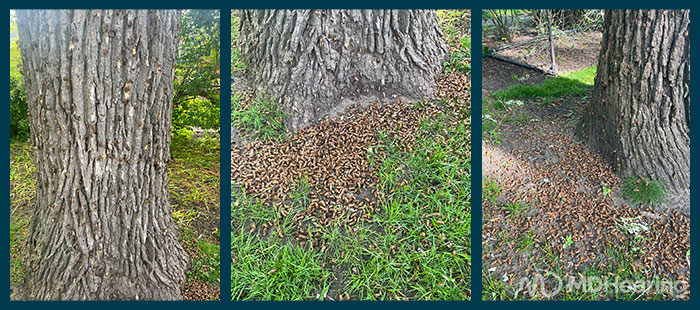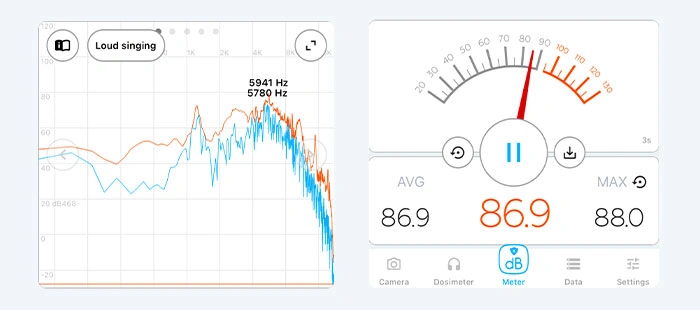If you’ve been watching the news lately, you’ve likely heard of the “double brood” of cicadas that is emerging across the United States. So what’s all the buzz about, and should you be worried about the cicada noise outside your window?
What Are Cicadas?
Cicadas are a family of insects found across the globe that are known for their loud, distinctive noises. They’re easy to recognize by their transparent wings and large wide-set eyes.
Fascinatingly, cicadas spend the vast majority of their lives (between 2 and 17 years) completely underground in the immature nymph stage. After hatching, the young cicadas burrow beneath the soil, feeding on sap from tree roots for years. When they are ready to emerge, cicadas spend only a few weeks above ground in the mating phase before dying—starting the cycle all over again.
The good news is that cicadas aren’t dangerous to humans; they aren’t aggressive and don’t bite or sting. They also play a valuable role in the ecosystem. Cicadas are a favorite snack for birds, and their bodies provide nitrogen to plants after they die.
Most cicada species are annual, meaning that members of the species emerge from underground every year. However, there are seven species in North America called periodical cicadas that only emerge every 13 or 17 years.
Cicada “Double Brood”: What You Need to Know
The term “brood” refers to the massive groups of periodical cicadas that emerge on a predictable cycle. For example, Brood XIII emerges every 17 years in northern Illinois and nearby areas, while Brood XIX emerges every 13 years across the southeastern U.S. Multiple species of periodical cicadas can be part of a single brood.
2024 is a particularly exciting year for cicada lovers because of the “double brood.” Both Brood XIII and Brood XIX cicadas are emerging this year, which started in late April and May. Scientists have estimated that literally trillions of cicadas will appear across 17 U.S. states. This convergence hasn’t happened since 1803, and it won’t happen again for another 221 years.
However, most people won’t see double the normal amount of cicadas, because the two broods only overlap in a small area in central Illinois. Check this map to see if cicadas are expected in your neck of the woods.
The precise timing of these cicada swarms depends on the weather in your area. Cicadas prefer to emerge when the temperature below ground has reached a cozy 64 degrees Fahrenheit. With only a few short weeks to live above ground, the first cicadas to emerge from these broods have already started to die off in late May, while the last ones will likely stick around until July.
Cicadas in the backyard of MDHearing's CEO, outside of Chicago
What Do Cicadas Sound Like?
Cicada noise is usually easy to recognize, with many people calling it “the sound of summer.” While different species make different noises, it can usually best be described as a loud buzzing sound.
The sound of one periodical cicada species, Magicicada cassini, has been described as “numerous clicks, followed by a quickly rising buzz.” Another periodical cicada species, Magicicada septendecula, has songs that are “not as loud, high-pitched, raspy, and [with] a series of buzzes that become more rapid and transition into lisps.” A third species, Magicicada septendecim, sounds like a whistling tea kettle or the word “pharaoh”—hence its common name, the “pharaoh cicada.”
Want to hear for yourself? This New York Times article and this YouTube video have good examples of all three cicada songs.
Why Do Cicadas Make Noise?
Different cicada species make different sounds because cicada noise is mainly used for mating—it’s how members of the same species find each other. Male cicadas have abdominal membranes called tymbals that they vibrate to produce noise. This explains why they sound different from insects such as grasshoppers and crickets, which make noise by rubbing their hind legs against their wings.
Male cicadas congregate in large groups called “choruses,” blasting their songs at high volume to attract female cicadas. They also have a specific courtship call when beginning the mating process, and a distress call when disturbed.
How Loud Can Cicadas Get?
Cicada noise can be quite loud. A species of African cicada, Brevisana brevis, holds the record for the world’s loudest insect. It was recorded at 107 decibels from 20 inches away—nearly as loud as a chainsaw.
Of course, the volume of cicada noise depends on how far away you are from the insects. A tree full of singing male cicadas might be measured at 70 to 80 decibels at a distance. On a decibel chart, that’s about as loud as a vacuum cleaner or a police siren. At close range, however, the same noise might be 90 to 100 decibels—as loud as a lawnmower, subway train, or factory machinery.
Cicada noise can easily go above 85 decibels, the threshold where prolonged exposure can begin to cause hearing damage, according to U.S. agencies such as OSHA. In addition, media articles about cicadas sometimes have sensationalistic headlines, calling the insects “deafening” or suggesting they could cause hearing loss.
Cicada noise level in the backyard of MDHearing's CEO, outside of Chicago, June 3, 2024
However, the U.S. Centers for Disease Control and Prevention (CDC) has put out an article debunking these common myths. While noise levels above 85 decibels are technically considered “hazardous,” short exposures are unlikely to cause hearing loss. Unless you’re standing under a cicada-infested tree for multiple hours a day, the noise of these insects is more likely to be bothersome than truly damaging.
Protect Your Ears with MDHearing
While fears of hearing damage from cicada noise are overblown, protecting your ears in loud environments is always a good idea. If you’re one of the 29 million Americans who could benefit from using hearing aids, MDHearing can help. We’ve provided over 800,000 customers with affordable, high-quality, FDA-registered, over-the-counter hearing aid devices. To see if hearing aids are right for you, take our free online hearing test today.
Check your hearing now with MDHearing’s online hearing test and get your results instantly.
TAKE ONLINE HEARING TEST


